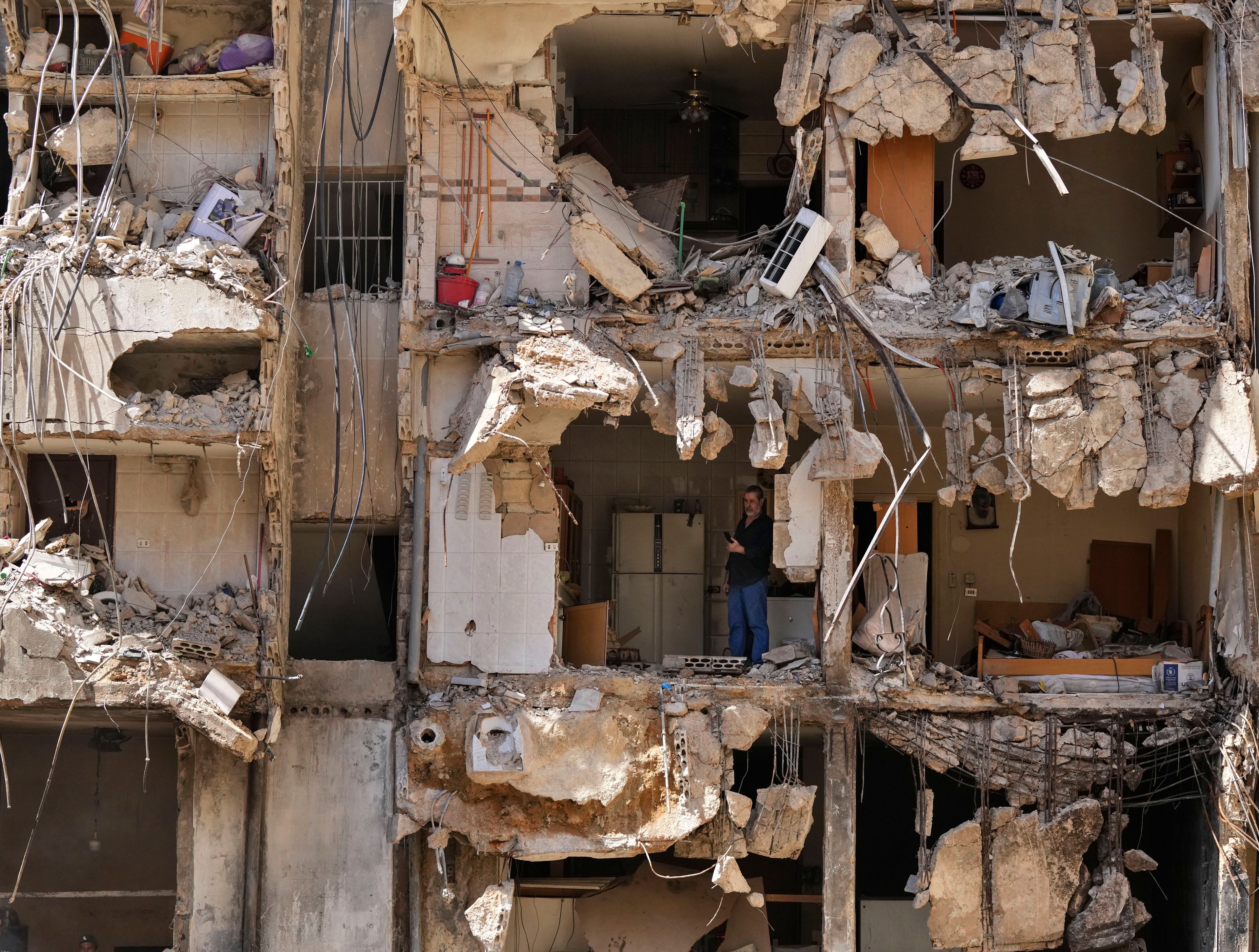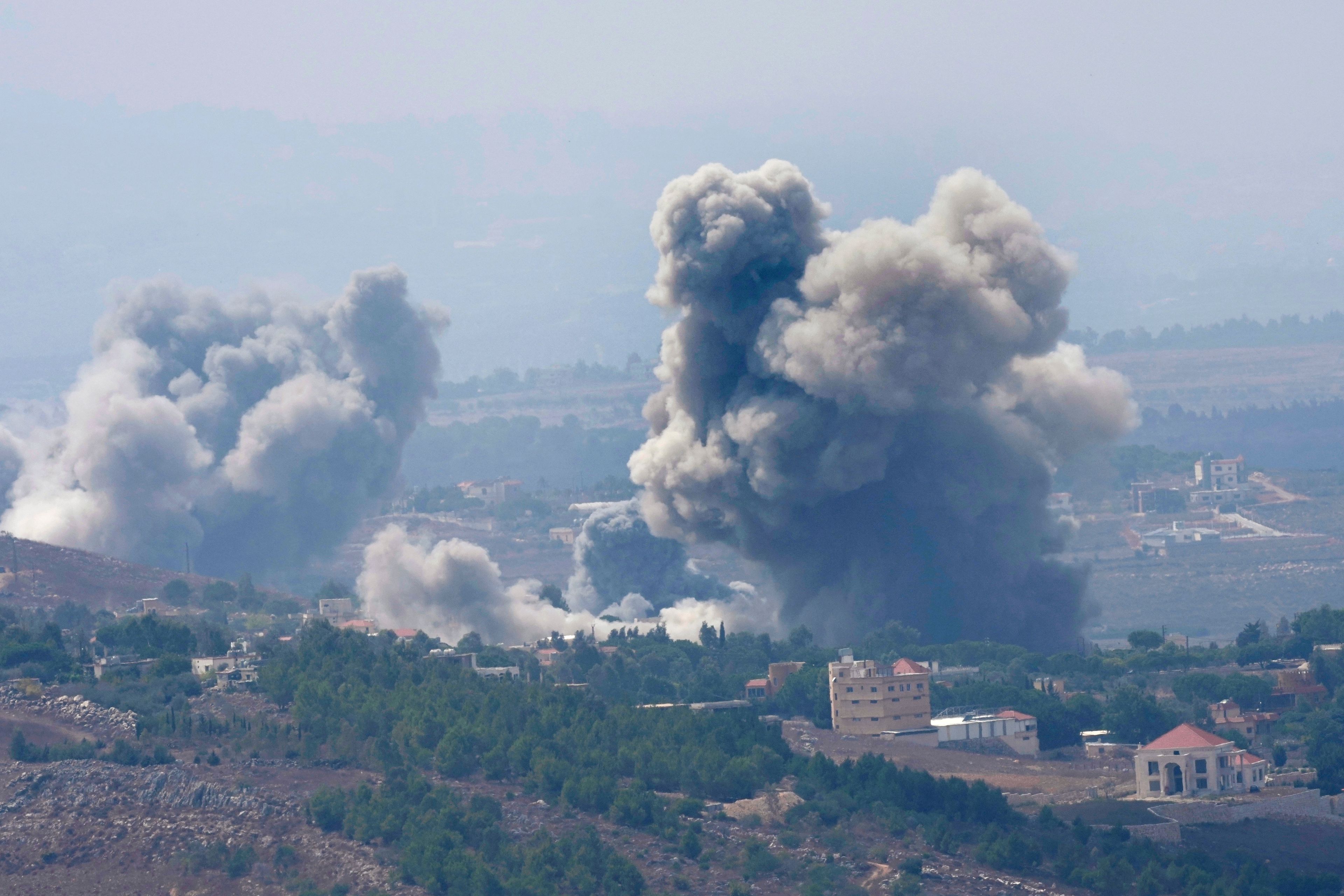Israel has landed heavy blows on Hezbollah. The victory it seeks could prove elusive
It has been
It has been a devastating week for Hezbollah and the people of Lebanon.
Bombs hidden in the group's pagers and walkie-talkies killed dozens of people and wounded thousands — many of them Hezbollah members. Israeli strikes on Beirut killed two of its top commanders. And Israel has bombed what it said were 1,600 militant sites across large parts of Lebanon, killing hundreds of people and displacing thousands.
Israel says its objective is to secure the border so that tens of thousands of people who fled under Hezbollah fire nearly a year ago can return to their homes. But it's far from clear that its recent operations — as tactically successful as they were — will bring that about.
“No one either in or out of the defense establishment has any clue as to how to translate these brilliant operational achievements into political benefit, into a real victory that will stop the war in the north,” columnist Nadav Eyal wrote in Israel’s Yediot Ahronot newspaper.
“As long as Hezbollah retains any firepower, the northern border will not be able to return to normal.”
Hezbollah began firing into Israel the day after Hamas' Oct. 7 attack triggered the war in Gaza. Its stated aim was to pin down Israeli forces in the north to help its ally Hamas, which — like Hezbollah — is backed by Iran. The Lebanese militant group has said it would cease the attacks if there is a cease-fire in Gaza, which appears increasingly unlikely.
Hezbollah's response to the past week's escalation has seemed meager. The hundreds of rockets and drones it has fired into northern Israel — including areas much farther from the border than it hit previously — have caused few casualties and only scattered damage.
But experts say it can weather Israeli strikes and is likely holding its most potent weapons in reserve.
Israeli air power has its limits
The footage on Monday of Israeli strikes sending up plumes of dust and smoke seemed grimly familiar.
The American-led invasion of Iraq in 2003, the NATO campaign in Libya in 2011, and the U.S.-led war against the Islamic State group in 2014 all began with massive airstrikes lighting up the sky. In each case, the war dragged on for months or years, and ground forces played a crucial role.
Israel's war against Hamas in Gaza began with nearly three weeks of heavy airstrikes across the territory, followed by a full-scale ground invasion. Nearly a year later, Hamas is still putting up a fight and holding scores of hostages.
With Hezbollah, Israel has so far adopted narrower objectives — not the disarmament or defeat of the Lebanese militant group, but a new arrangement in which militants retreat from the border and halt their attacks.
But even that may not be possible without a ground invasion.
There's also the risk of mission-creep, as America discovered after its wars in Iraq and Afghanistan ground on for years after the toppling of Saddam Hussein and the Taliban. NATO airstrikes initially aimed at preventing a feared massacre in Benghazi morphed into a seven-month campaign of regime change from which Libya has yet to fully recover.
Hezbollah likely has capabilities we haven't seen yet
Israel's Defense Minister Yoav Gallant boasted that Monday's strikes alone had taken out tens of thousands of Hezbollah's rockets and missiles.
“This is the most difficult week for Hezbollah since its establishment," he added. "A blow has been dealt to the chain of command, to the terrorists themselves on different levels, to their shooting capabilities and to their morale.”
Hezbollah has acknowledged suffering heavy blows, but even if Gallant's assessment is correct, it still has considerable resources.
“The rocket unit is still active, Hezbollah has absorbed the initial shock, and the battle has only begun,” said Qassim Qassir, a former Hezbollah member who wrote a book about the group. “Hezbollah has only used a small part of its capabilities."
The militant group was established with the help of Iran following Israel's 1982 invasion and occupation of Lebanon, and it seeks Israel’s destruction. It has survived countless battles with Israeli forces, replaced several slain commanders over the years and rearmed after a monthlong war in 2006.
Hezbollah claims to have some 100,000 fighters. Before the latest hostilities, it was believed to have some 150,000 rockets and missiles, including long-range projectiles capable of hitting anywhere inside Israel, and some precision-guided missiles.
Its more sophisticated weapons are likely being held in reserve as it seeks to avoid triggering an all-out war.
Sarit Zehavi, a former Israeli military intelligence analyst and founder of the Alma Research and Education Center, a think tank focused on the northern border, said Hezbollah has concealed its weapons in different parts of the country, including in areas close to Beirut where it has a strong presence.
“Hezbollah was building redundancy, so they spread their munitions and infrastructure all over, and that’s why that many targets are being attacked, because it’s everywhere,” she said.
Hezbollah is far more advanced militarily than Hamas. Hezbollah also has a far larger area in which to operate, extensive supply lines linking it more directly to Iran, and networks of tunnels potentially even more extensive than those in Gaza.
In the event of a ground invasion, Hezbollah fighters could be joined by thousands of fighters from fellow Iran-backed groups from Iraq, Yemen and elsewhere in the region.
Neither side has good options
Israel says it has no immediate plans for a ground invasion but is prepared for one, and has sent thousands of battle-hardened forces from Gaza to the northern border. If the air campaign fails to bring Hezbollah to heel, Israeli leaders will be tempted to send them in.
Even if the goal is only to carve out a buffer zone to better secure the north, the risks are great.
Most Israelis are insulated from the air war by distance and Israel's missile defense systems, but a ground invasion would mean more casualties and protracted fighting for soldiers and reservists already weary from a year of war in Gaza.
Hezbollah waged an 18-year-long insurgency against Israel the last time it occupied Lebanon, eventually forcing it to withdraw, and another prolonged occupation could be similarly costly.
Israel has already faced international outrage over the war in Gaza, including ongoing investigations by top world courts, and risks even greater isolation if it launches a similar campaign in Lebanon.
Hezbollah also has few good options.
Halting its rocket fire on the north in the face of Israeli pressure would likely be seen by its supporters — and its patron Iran — as a humiliating capitulation and an abandonment of the Palestinians.
Escalating its attacks, either by launching more sophisticated rockets or targeting major cities like Tel Aviv, could bring an even more crushing Israeli response or an all-out war that devastates Lebanon — with Hezbollah at risk of being blamed.
Hezbollah leader Hassan Nasrallah already faces criticism from many Lebanese who accuse him of tying their country’s fate to Iran and inviting war at a time of financial ruin.
That leaves it stuck with the status quo, in which Israel carries out increasingly heavy strikes while Hezbollah makes do with a relatively restrained response.
For Hezbollah, and the Lebanese people, that might make the coming weeks even worse.
___
Associated Press reporters Melanie Lidman in Tel Aviv, Israel and Bassem Mroue in Beirut contributed to this report.
Connect with the Southeast Missourian Newsroom:
For corrections to this story or other insights for the editor, click here. To submit a letter to the editor, click here. To learn about the Southeast Missourian’s AI Policy, click here.
























